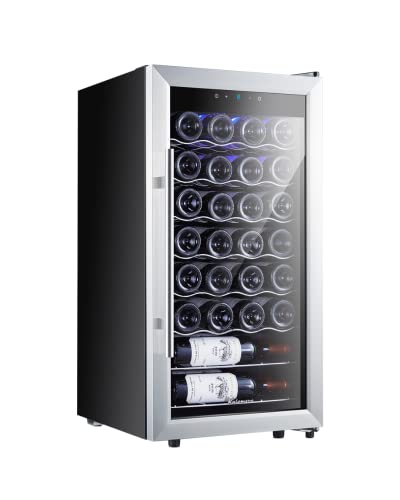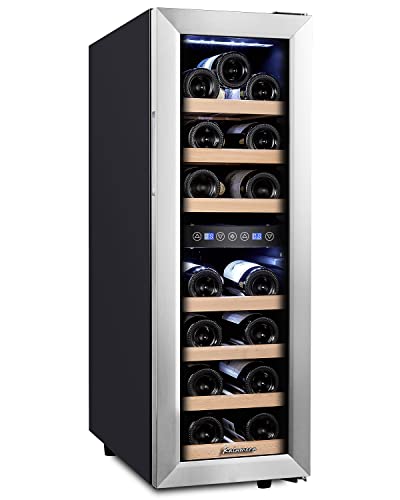Are You Getting The Most From Your Wine Fridge?
페이지 정보
작성자 Zelma Wheatley 댓글 0건 조회 27회 작성일 24-09-11 01:21본문
 The Importance of a Wine Fridge
The Importance of a Wine FridgeWine fridges are an affordable solution for anyone who collects wine or loves to have a glass of wine with a group of friends. They can also help you grow your collection over time.
In contrast to traditional compressor-based refrigeration systems, thermoelectric wine refrigerators are based on the Peltier effect, where electricity is passed between two separate junctions, creating a cooling effect.
Controlling Temperature
To ensure the quality of fine wine, it is important to maintain ideal temperatures. Wine refrigerators are designed for various varieties of wine and keep temperatures within a narrower range. This allows for optimal maturation, turning an ordinary bottle into an extraordinary one over time.
The capability of a wine fridge to provide the ideal climate for wine is due to the precise interplay of many essential features and techniques. The most crucial aspect is the internal cooling system. It is comprised of the thermoelectric Peltier module that is extremely efficient and a heat sink. The part of the Peltier module that absorbs heat reduces the internal temperature, and the other side releases the absorbed heat and creates a cooler environment for wine.
In addition to temperature, wine fridges come with an exact humidity control system. This is a crucial feature as it guards against oxidation and cork degrading. Wine fridges have a relative humidty between 50 and the 80% mark. This is the perfect balance to stop dry corks from burst and allowing air to enter the fridge, resulting in spoilage.
The internal ventilation system in the Wine Cooler refrigerator is a different aspect that helps in maintaining a consistent temperature. The refrigerators are typically equipped with a powerful fan that circulates air through the entire cabinet, eliminating pockets of warm or humid air. This ensures that every bottle gets the same amount of cool air regardless of where it is located in the fridge.
The cooling system is designed to avoid vibrations, which can interfere with the uniform distribution of temperature and lead to fluctuations. It is recommended to limit vibrations by limiting the amount of times you open and shut the door of your refrigerator. Also, ensure that the bottles you put in your refrigerator do not block the vents and interfere with the fan.
The controlled environment of a wine fridge is essential not only to store wine but also for other food items that are delicate like cheeses and Charcuterie. These artisanal delights can be consumed at any point, as they retain their original flavors and textures. Additionally certain herbs and supplements benefit from being stored in a cool and controlled environment to maximize their efficacy and potency.
Maintaining Humidity
A lot of people overlook when it comes to wine storage, humidity is an essential element that can be easily managed. Humidity can have a direct effect on the quality of your wine, and is crucial for long-term storage. It is recommended that wines be stored in a place where the relative humidity (RH) is constant between 50-70%. The control of humidity is crucial to protect your collection from damage while maintaining the ideal conditions for maturation of your wine.
Humidity affects the delicate balance of aromatic compounds that affect wine's taste profile. Changes in the composition of these ingredients can alter the flavor profile of wine and can also lead to wine fridge small spoilage.
The best way to regulate the humidity in your wine fridge is by utilizing a hygrometer. These devices are relatively inexpensive and can help you create the ideal temperature for your wine collection.
When you purchase high-end wine refrigerators, you will benefit from humidity control systems. These systems monitor and adjust moisture levels, ensuring optimal conditions for wine. Humidity control prevents corks from drying and swelling which could allow air to enter the bottle and ruin wine. It also helps reduce oxidation and ensures that labels are legible. This preserves your wine's integrity and increases its value.
Other methods to increase the humidity of your wine fridge is to place a container filled with water inside. This will slowly evaporate and raise the humidity levels. Baking soda is another option, as it is known for its ability to absorb moisture. Place open containers in your wine refrigerator and replace them on a regular basis to ensure their effectiveness. You may also consider purchasing an absorber of moisture that consists of a series of trays that are filled with mineral salts that are recognized for their ability to naturally absorb excess water from the air. This will not only aid to stabilize wine chiller kitchen temperatures, but it will also shield against mold and other contaminants.
Redefining Aging Potential
It requires more than an area in the refrigerator to store wine in a proper manner. It involves ensuring that wine is stored under ideal conditions to preserve its aging potential. In contrast to standard refrigerators, which are designed to keep food cold, wine fridges are specifically engineered to maintain optimal temperatures, humidity, and light levels. This safeguards your investment by protecting each bottle from premature oxidation and damage to the cork.
Wine fridges are self-contained units that can be operated straight out of the box. Dual-zone wine refrigerators are more sophisticated and permit you to store red and white wines at different temperatures. The simplest models have a single temperature that can be manually adjusted. Internal fans ensure that all bottles are exposed to the same airflow, which prevents pockets of warm or humid air from developing. This also helps ensure that all bottles receive the same level of cooling, allowing each to reach its maximum aging potential.
The Peltier effect is utilized to cool thermoelectric wine refrigerators. A Peltier module is a device that transmits an electric current through two metal pieces that are connected. It absorbs heat from one and expel it from the other. This process generates no refrigerant, making it an alternative to compressor-based wine fridge uk coolers which use hydrofluorocarbon gases. Thermoelectric wine fridges are also known for their energy efficiency, as they use less electricity to deliver the same cooling effect as compressor units.
When choosing a wine refrigerator it is essential to consider the intended duration of storage. For long-term storage, an optimal temperature range of 50degF and 55degF or 10degC and 12degC is essential to preserve phenolic compounds which contribute to the wine's aroma, taste, and mouthfeel. Storage of wine for short-term storage, on the other hand requires a slightly higher temperature that is between 55degF to 60degF or 12degC in order to avoid premature oxidation and preserve fruit flavors.
The lighting system of a wine fridge is designed to limit exposure to ultraviolet (UV) radiation which can quickly degrade wine by degrading its aromatic compounds as well as color. Many of today's compressor models and thermoelectric wine refrigerators have glass or doors that are UV-resistant to protect your wine. Additionally, some wine refrigerators have vibration reduction systems that limit disturbances and create a peaceful environment for storing aged bottles.
Maintaining Cork Longevity
A wine fridge isn't just an efficient storage solution, it's an active guardian of your wine. A wine fridge guards your bottles against humidity reduction, temperature fluctuations and vibration disturbance, whether you're storing them to be used for short-term storage or maturation.
Consistent temperatures will decrease the amount of oxygen that gets into corks, which causes your wine to deteriorate. This stops oxidation, which could cause wine to lose its vibrancy and develop off-flavors. Wine fridges also ensure optimal humidity levels to keep dry corks from shrinking and letting air in the bottle.
This allows the cork to expand and create an airtight seal, which is crucial for long-term aging. The majority of wine refrigerators are equipped with compressor cooling or thermoelectric systems, so you can choose the best option for your collection.
The dark and dark-colored environment of a wine fridge protects your bottles from damaging UV light. UV rays harm volatile wine compounds, lowering quality and speeding the aging process. Moreover, the dark interiors of wine fridges shield your wine from household odors that could contaminate the flavor and aroma. While a simple package of baking soda may be effective in absorbing some of these odors, the wine fridge comes with built in wine fridge-in odour control systems that ensure that your wine is always ready to serve.
 Most importantly, wine refrigerators minimize vibration disturbance that can agitate your sedimented wines or affect the cork's tightness and durability. This is particularly important as refrigerators used in the home typically store foods as well - including aromatic leftovers that can be absorbed into your precious bottles of cabernet, and overpower the natural flavors. Certain wine refrigerators come with odour neutralization technologies that remove smelly residues and odours found in household refrigerators, such as paint cleaning products, cleaning chemicals and other chemicals.
Most importantly, wine refrigerators minimize vibration disturbance that can agitate your sedimented wines or affect the cork's tightness and durability. This is particularly important as refrigerators used in the home typically store foods as well - including aromatic leftovers that can be absorbed into your precious bottles of cabernet, and overpower the natural flavors. Certain wine refrigerators come with odour neutralization technologies that remove smelly residues and odours found in household refrigerators, such as paint cleaning products, cleaning chemicals and other chemicals.댓글목록
등록된 댓글이 없습니다.